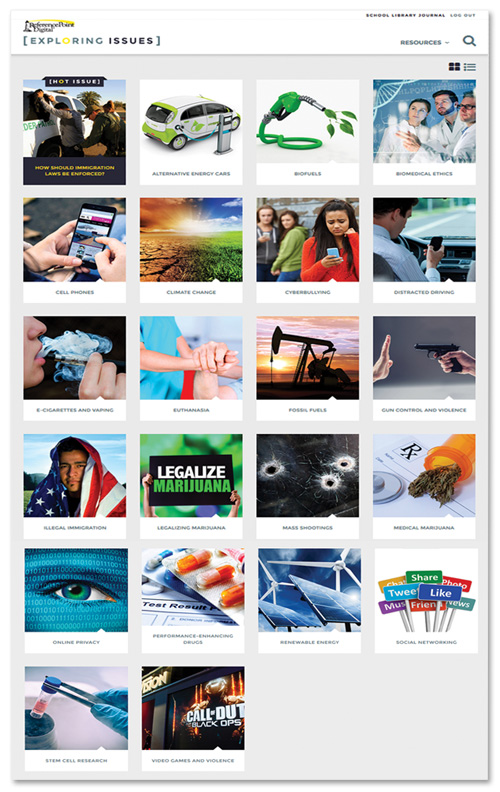ReferencePoint's New Database Considers Both Sides of the Argument
 Hot-button, up-to-the-minute topics that touch the lives of students are commendably examined in this excellent database.
Hot-button, up-to-the-minute topics that touch the lives of students are commendably examined in this excellent database. ReferencePoint’s Exploring Issues
Grade Level 9 Up
Cost A single-site license is priced at $295 per year. For information on multisite pricing, please contact the publisher (info@referencepoint press.com ).
Content This resource investigates major issues that are the subjects of classroom assignments and pro and con debates—and that may also seriously impact teens’ personal lives. Information on 21 separate topics (which include alternative energy cars, biofuels, biomedical ethics, cell phones, climate change, cyberbullying, distracted driving, e-cigarettes and vaping, euthanasia, fossil fuels, gun control and violence, and more) is divided into pictured tabs.
Choosing an issue leads to a page containing relevant, thought-provoking questions (“How serious a problem is cyberbullying?” “Is cyberbullying worse than traditional bullying?”) on which students may base research papers or classroom and school debates—and examine their own feelings about these issues.
When users click on a question, they are taken to a page with an overview paragraph that explains the topic in clear, dynamic prose and includes quotes from authoritative sources. In addition, numerical data, such as percentages, dates, or statistics that support the narrative, are included. These comprehensible figures effectively clarify points and demonstrate for researchers that no matter what viewpoint one holds on any given issue, one’s position must be backed up by reliable, documented facts. Also included are links that enable students to explore the topic further, along with helpful infographics.
The database’s chief highlight is the “Debate at a Glance” feature, which presents pro and con arguments for each question raised, quotes, and a fully developed exploration of each viewpoint, making it a great source of material for debaters. “Focus Questions” guide students as they study the case to be made for both sides of issues. Another helpful addition is “Related Issues,” a group of tabs through which researchers may quickly and easily link to similarly themed topics in the database.
Overall, the material is first-rate and will be updated in the future, with further issues added and content about existing issues revised as needed. The sole drawback is the glossary; many students would find it more useful if it were more extensive, with topic-specific terms (e.g., “WTI” for the page on biofuels).
Ease of Use Clicking on a specific image allows quick, efficient access to content and debates on each topic. With a quick stroke, researchers may also use the “Select Issue” pull-down menu at the top right-hand side of the screen to refer to different subjects, alphabetically arranged, without having to return to the main menu. The database’s sensible, straightforward design, with easily navigable links and the “Debate at a Glance” feature at each site, makes this a comfortable, intuitive resource. The sheer depth and breadth of material equate to a virtually “one-stop shopping” source of material.
Student and Teacher Resources “Cite This Page” notations for text and infographics demonstrate how to format material from the database in research papers according to three different bibliographic styles—MLA, Chicago Manual of Style, and APA. Each issue also contains source notes, a “Facts” link that opens to a glossary and extra information about terms and concepts, additional downloadable or printable infographics, a list of related organizations and websites, and a bibliographical link to books, periodicals, and Internet sources.
Finally, clicking on the “Resources” button on the upper right-hand corner of the screen leads students to downloadable guides to research, writing, and critical reading and understanding opinionated writing. Teachers can find guides to teaching critical thinking as well.
Verdict This is an exemplary resource for serious, sophisticated students. It takes a reasoned, balanced, nonjudgmental approach, supported by facts and figures, to topics much in the news. Researchers will find much substantive material on which to base written and/or debate assignments, yet the information is manageable and student friendly, using calm, straightforward prose to convey often difficult subject matter.
RELATED
The job outlook in 2030: Librarians will be in demand
The job outlook in 2030: Librarians will be in demand
ALREADY A SUBSCRIBER? LOG IN
We are currently offering this content for free. Sign up now to activate your personal profile, where you can save articles for future viewing






Add Comment :-
Be the first reader to comment.
Comment Policy:
Comment should not be empty !!!